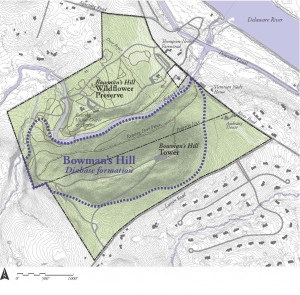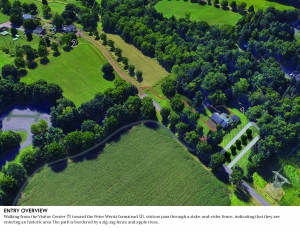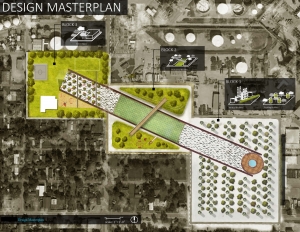Congratulations to the 2019 PA-DE ASLA Professional Award Recipients!
Thank you to New York Upstate ASLA for jurying the 2019 awards program.

Understanding Rio de Janeiro’s Favelas: A Plan for Santa Marta’s Future Expansion
Cristina Frass, Hannah Claire Winn, Kyle Sven Johnson, Bernardo Almeida Barra
Penn State University
Faculty Advisors: Marc Miller and Jose Duarte
Project Type: Master Plan
Project Location: Santa Marta Favela, Rio de Janeiro, Brazil
Favelas in Rio continue to expand in number and size, as people migrate into urban areas and the population increases. It’s imperative to find design solutions that can improve the living conditions of favelas while maintaining their feasibility of construction.
This project explores a possible expansion of the Santa Marta favela. Through analysis of the existing settlement, the project utilizes Santa Marta’s efficient use of space, while providing a framework that maximizes public space opportunities.

Bowman’s Hill: Reconnecting a Divided Landscape
Kristie Lane Anderson
Temple University
Faculty Advisors: Baldev Lamba, Sue Mrugal, and Michael Coll
Project Type: Park
Project Location: Bowman’s Hill Wildflower Preserve, New Hope, PA
Bowman’s Hill rises high above the surrounding landscape, and has served as a local landmark for centuries. Today, the hill is split into two parks that share a common origin, but different histories: Bowman’s Hill Tower, and Bowman’s Hill Wildflower Preserve.
The division has led to visitor confusion, operational challenges, and ecological degradation. This project aims to reunite the whole of Bowman’s Hill, and to celebrate the human, ecological, and geological richness of the site.

The Peter Wentz Farmstead: Designing for the Future on an Historic Farm
Lucinda Bartley
Temple University
Faculty Advisors: Baldev Lamba, Susan Mrugal, Michael Coll, and Mary Myers
Project Type: Historic Site Master Plan
Project Location: Worcester, Pennsylvania
The Peter Wentz Farmstead preserves a wealthy eighteenth century Pennsylvania German farm that served as temporary headquarters to George Washington during the Revolutionary War. A landscape master plan expands the historic interpretation of the site, increases access for visitors through new trail systems and building uses, and improves the ecological health of the land and creek. The historic setting informs all design decisions to create a coherent and integrated new plan.

Softening the Edge: A Strategy to Reduce Air Pollution in Houston’s Fence-Line Communities
Cristina Frass
Penn State University
Faculty Advisors: Larry Gorenflo and Marc Miller
Project Type: Public Space Design
Project Location: Houston Ship Channel, Harris County, Texas
Fence-line communities in Harris County are at an increased risk of exposure to air pollutants, and often lack the socioeconomic means to seek healthcare against the pollutant’s chronic effects. This project proposes to reduce air pollution through bio-filters: systems that utilize microbes to break down air pollutants. The project creates recreational and educational opportunities by exposing the bio-filtration process in a public space, through landscape designs that provide a unique aesthetic appeal to the site.
